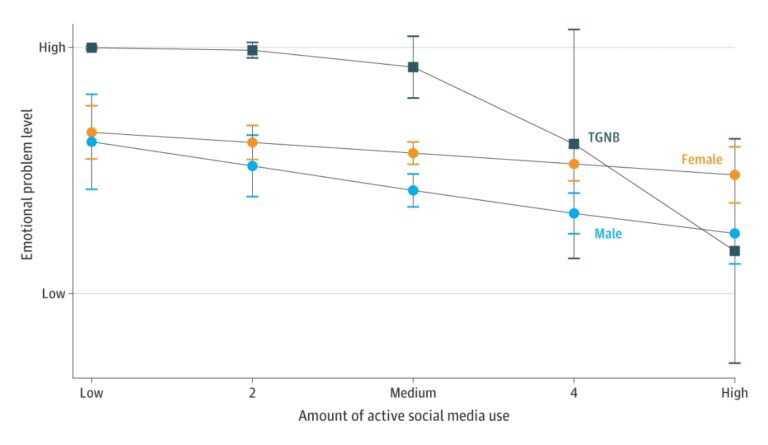Social Media Safety
While spending less time on social media might be a positive experience for young cisgender people, it can cause an increase in depression and anxiety among trans and nonbinary youths.

Read Time: 2 minutes
Published:
In May 2023, the U.S. Surgeon General, Vivek Murthy, issued an advisory warning the public of the adverse impact of social media on children’s mental health. Transgender and nonbinary youth are at particularly high risk for depression, anxiety, and other mental health disorders and may be particularly prone to social media augmented symptoms.
Researcher Sarah Coyne and colleagues examined the connection between social media use and effects on mental health among cisgender, transgender, and nonbinary youth. They analyzed data from an online survey of 1,231 participants, age 10 to 17, across the United States. The survey included questions about mental health and body image, time spent on social media, self-identified problems with social media, social media breaks, and efforts toward cleaning and curating their social media feeds.
Trans and nonbinary youth face a greater risk for emotional problems—including depression, anxiety, and body image issues—than their cisgender peers. However, as the figure above indicates, as social media use increased, participants’ emotional problems decreased more among trans and nonbinary youth.
The researchers also found transgender and nonbinary teens who regularly cleaned or curated their social media feeds had lower rates of depression and conduct problems. Additionally, intentional breaks from social media can increase depression for transgender youth but not for their cisgender peers. While spending less time on social media might be positive for young cisgender people, it can cause harm to transgender youths.
The researchers note that decreasing social media use impacts gender identities differently. The research team warns that blanket policies and legislation designed to limit screen time may negatively impact trans and nonbinary youths. Instead, they recommend state- and national-level policy interventions focused on school-based media literacy programs to teach young people safer ways to interact online.
Databyte via Sarah M. Coyne, Emily Weinstein, J. Andan Sheppard, et al. Analysis of Social Media Use, Mental Health, and Gender Identity Among US Youths. JAMA Network Open, 2023.



